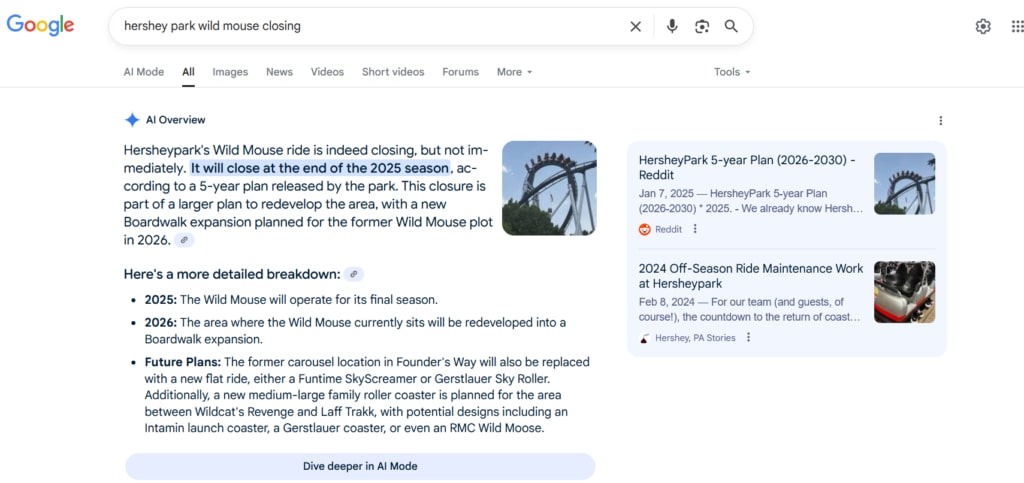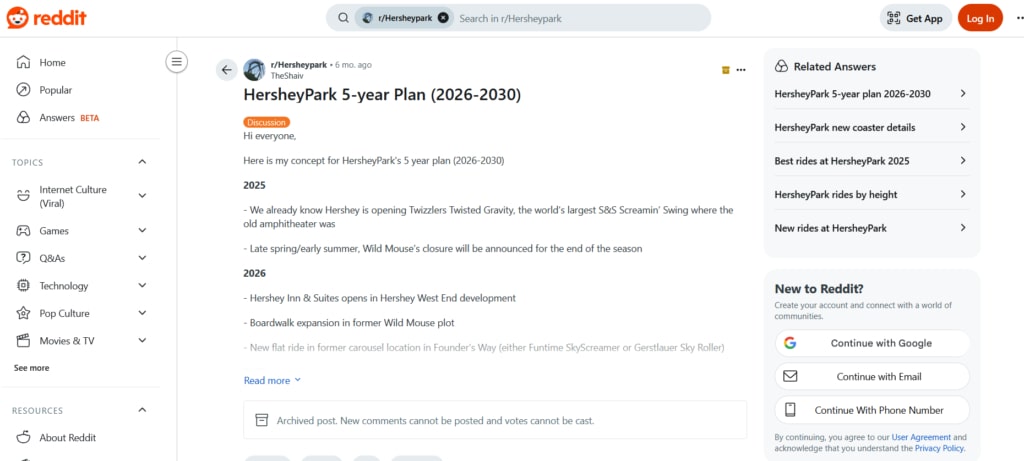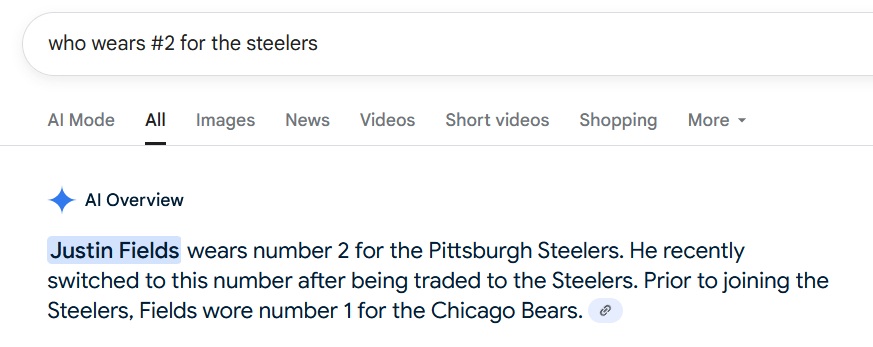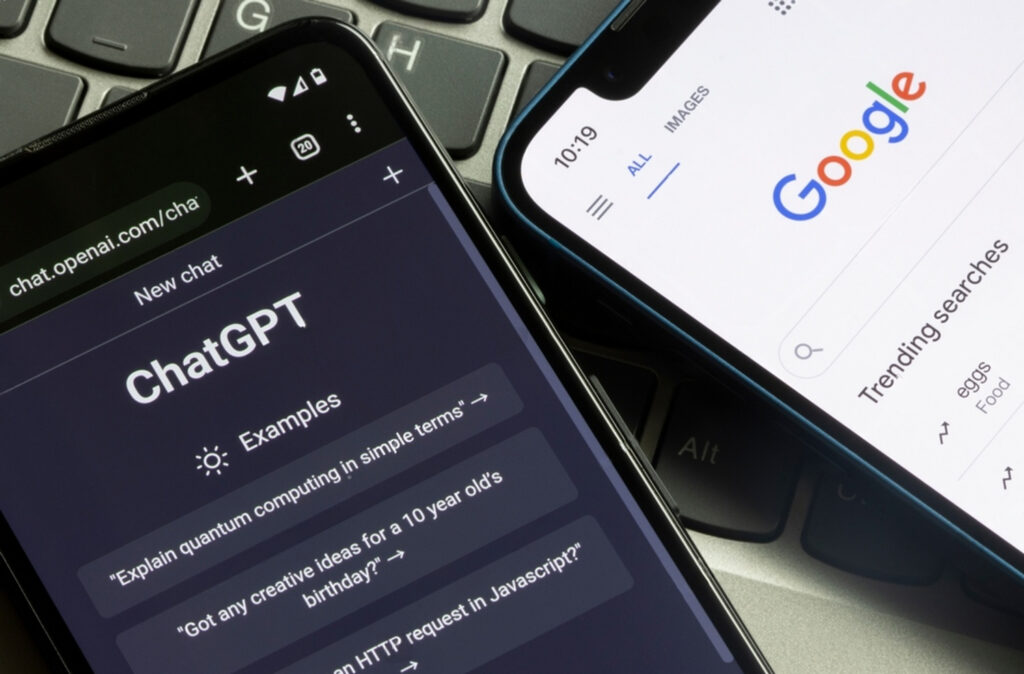What Looked Like a Simple Facebook Rumor Turned Into an AI Misinformation Lesson
In early 2025, a discussion started circulating in a local Facebook Group dedicated to Hershey Park fans. As a regular park-goer, I often check these groups for planning tips and updates. One post in particular stood out: a screenshot from Google’s AI Overview claiming that the Wild Mouse ride would be closing at the end of the summer.
There was no official press release. No announcement on the park’s website or social media. Just a generated summary based on indexed content, possibly a forum thread, speculative article, or outdated news.
As someone who tracks search results closely, I’ve seen my share of questionable AI Overviews—so I decided to dig deeper.
Was the claim about Hershey Park’s five-year plan backed by an official press release? A public statement on social media? A credible news article?
None of the above.

The information didn’t come from an official source. It was pulled from a Reddit thread where a user named TheShaiv shared a personal theory about what Hershey Park’s five-year plan could be. That speculative post, written by a creative but unofficial source, was shown in Google’s AI Overview as if it were verified fact.
Google introduced AI Overviews to make search more helpful by delivering fast, concise answers. But when these summaries misinterpret content, even slightly, they can pull speculative or inaccurate data from public forums and present it with authority. This creates confusion and puts businesses at risk.
This isn’t an isolated case. Since launching in the U.S. in May 2024, AI Overviews have sparked concern across the digital marketing space. Early examples included advice like adding glue to pizza, eating small rocks daily, and attributing achievements to people long after their deaths. These weren’t minor glitches. They were widespread, confidently delivered errors that spread quickly.
For businesses, this can be more than a misunderstanding. When false or misleading summaries misrepresent your brand, they can damage trust, confuse potential customers, and spread misinformation across search results where it matters most.
The Real Problem: AI Still Struggles with Context
The core issue lies in how AI understands, or often misinterprets, context. Even Google has acknowledged that its AI Overviews sometimes produce misleading or inaccurate answers. In their May 2024 update on AI Overviews, the company outlined steps it’s taking to improve quality and reduce the spread of incorrect information.
Here’s what’s actually happening behind the scenes.
Google’s AI is highly effective at surfacing content that matches specific keywords. For example, a search for “Hershey Park Wild Mouse closing” may lead it to a Reddit thread by a user named TheShaiv. That post includes all the right terms, Hershey Park, Wild Mouse, and closing, so the AI sees it as relevant.
What it fails to detect is just as important. The AI overlooks clear context that the post is speculative and unofficial. It doesn’t understand that the content reflects a fan theory or a creative idea, not a verified fact.
Imagine having a research assistant who is extremely fast but lacks judgment. They might return exactly what you asked for, but sourced from a comment thread or a fantasy concept instead of a credible authority.
Grasping intent, sarcasm, credibility, and nuance still requires human intelligence. Current AI models can find relevant phrases, but they often struggle to understand the meaning behind them. That difference can turn a helpful overview into a misleading headline.
Four Reasons AI Overviews Can Be Inaccurate
1. The Satire Problem
AI systems often fail to detect sarcasm or satire, even when it’s obvious to humans. In Google’s own May 2024 AI Overviews update, the company acknowledged several early misfires. One example included the AI pulling advice from forums suggesting users add glue to pizza to help the cheese stick a joke post that the system mistakenly interpreted as genuine guidance.
As reported by The Verge, this wasn’t a one-off incident. Forum content, especially when sarcastic or speculative, has repeatedly tripped up the AI into confidently presenting inaccurate or absurd answers.
Business Impact: If someone posts satirical or troll content about your business online, AI systems may misread it as credible and include it in AI-generated summaries. That kind of error can quickly distort public perception, especially if the joke spreads as fact in search results.
2. Confusing Trusted Sources with Random Ones
The Hershey Park example shows a big problem. Google’s AI Overview didn’t understand the difference between an official company update and a fan’s guess on Reddit. Instead of showing trusted news, it pulled information from a random post and treated it like a fact.
This happens because AI systems often grab sentences from websites without checking how reliable or serious the source is. They don’t always recognize if something is a joke, a rumor, or just someone’s opinion.
Business Impact: If someone posts a theory or joke about your company, AI might show it as real news. That can confuse your customers, hurt your reputation, and even impact business decisions.
3. Outdated Info Gets Treated Like It’s New

As reported by TechRadar, Google’s AI Overviews sometimes can’t tell the difference between old and new information. It might still think it’s 2024, even when something has clearly changed since then.
For example, if you search who wears a certain jersey number, the AI might show results for a player who wore it years ago, just because that’s what it finds first or most often on the web.
Business Impact
If your website or business has changed services, pricing, or offerings, outdated info might still show up in AI Overviews. This can confuse your audience, misrepresent your current services, and cause customers to lose trust in what you do.
4. Lack Of Information
Sometimes, there just isn’t much quality content online about a topic. In those cases, AI tries to fill in the blanks using whatever it can find, even if the info is totally off.
Google calls this a “data void” or “information gap.”
For example, let’s say there’s a brand-new product launch, a small industry update, or a recent business deal. If trusted sources haven’t covered it yet, AI might pull in guesses, old content, or unrelated posts that just happen to use similar words.
Marketing Impact
If your company is launching something new or entering a niche space, AI might show the wrong info—mixing in competitor details, outdated articles, or misleading guesses. That could confuse potential customers and hurt trust in your brand.
What Businesses Can Do to Keep AI Information Accurate
AI systems like Google’s AI Overview sometimes share incorrect or outdated content. That happens because these tools pull information from different websites, often without fully understanding the context. You can’t control everything online, but you can take clear steps to guide how your business is represented.
1. Create Reliable, Clear Content
Make your website the best source of truth about your business. Publish well-structured pages, helpful FAQs, and regular updates. Clearly explain your services or products so that both users and AI systems understand them easily.
2. Monitor Your Brand Online
Set up Google Alerts for your business name with words like “closed,” “delay,” or “issue.” Check how AI tools describe your company and flag any errors. If needed, release official statements or add clarifications to your website.
3. Give AI the Right Context
Avoid confusing or vague language. Use labels like “official update,” include the date of publication, and clearly separate facts from opinions. This helps AI systems understand your content correctly.
4. Establish Credibility
Make sure your business details are consistent across all platforms. Optimize your Google Business Profile, earn mentions from trusted industry websites, and stay active on relevant third-party sites. The stronger your online reputation, the more AI tools will trust your information.
The Competitive Reality Behind AI Search
Getting accurate business information into AI Overviews is more important than ever. Google is steadily increasing the number of AI-generated summaries in search results, and that’s no coincidence.
Google is responding to growing competition from tools like ChatGPT, Perplexity, and other AI-powered platforms that offer instant answers. To stay relevant, it’s adapting search to meet user expectations for fast, direct information. As explained in SE Ranking’s breakdown of AI Overviews, this shift is transforming how businesses must approach SEO and visibility.
Research from WebFX shows that users, especially Gen Z, now expect immediate, AI-driven responses rather than browsing multiple links. This creates pressure to deliver answers quickly, even when the available data is incomplete or difficult to interpret.
Google has stated that AI Overviews only appear when its systems are confident the result is helpful. However, the competitive reality of the AI market continues to raise the stakes. For a closer look at how Google determines when to show these summaries, check out the official AI Features in Search documentation.
What this means for your business:
Most AI Overviews are useful, but they are not always accurate.
Mistakes can impact how users perceive your brand, especially with niche or new offerings.
Instant answers are here to stay. Users expect them, and search engines will keep delivering them.
To succeed in this evolving landscape, businesses must focus on creating trustworthy content, building authority online, and regularly monitoring how AI systems represent them.
Want to make sure your business shows up correctly across Google and AI platforms like ChatGPT? Learn more about our SEO service or get in touch with our team.
Frequently Asked Questions
They’re quick summaries AI generates from different sources to answer search queries.
Because they often miss context or pull from unreliable or outdated sources.
Yes, it can mistake jokes or speculation as real info if context isn’t clear.
AI may treat a fan post or comment as an official source.
Sometimes, yes, AI might surface old content as if it’s still current.
Publish clear, up-to-date content and official updates.
Stay consistent, credible, and optimize content across platforms.
Yes, strong local content and Google Business Profile updates can improve accuracy.



